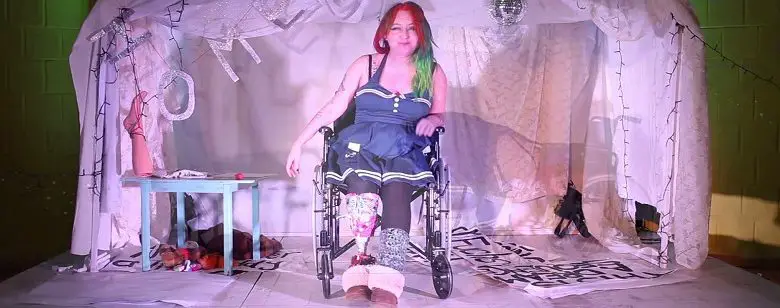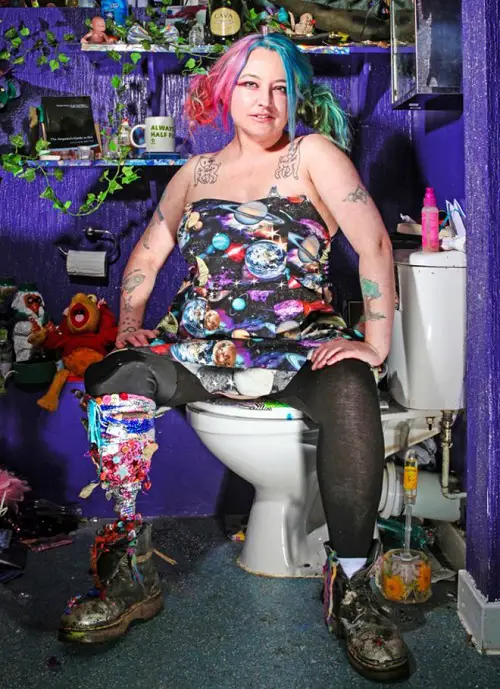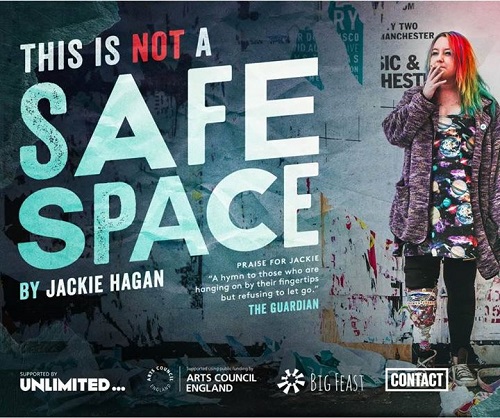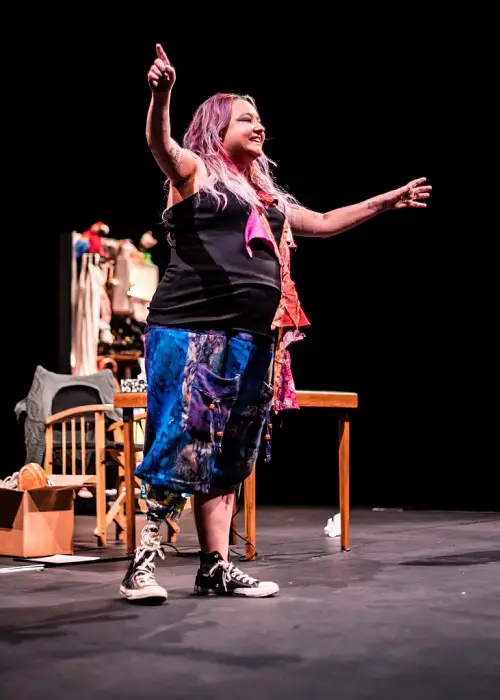
This is Not a Safe Space: a show about the truth of disability in the modern world
Award-winning poet and performer Jackie Hagan’s latest show, This is Not a Safe Space, explores the impact of benefit cuts on disabled peopled and those living on the margins of society. Carrie Aimes talks to Jackie about her creative mix of poetry, puppetry, stand-up comedy and audience participation, which draws on first-person interviews with 80 working-class people.
With an emphasis on class, mental health and disability, Hagan’s performances celebrate the weird and wonky lives of those excluded from the mainstream. Jackie Hagan describes herself as a queer, bipolar amputee, raised on a council estate. Her work seeks to challenge the ways in which current society relentlessly stereotypes working-class, disabled individuals.
Following on from her previous success with the solo show Some People Have Too Many Legs and her play Cosmic Scallies, this theatre maker once again intertwines spiky humour and quirky expression, resulting in a passionate, provocative and affecting production.
Jackie, could you please tell Disability Horizons readers about your disability and how it has affected you and your career?
I am partially sighted, have bipolar disorder and a life-limiting autoimmune disease. Then, in 2013, I had to have my leg amputated following a series of blood clots and infections. Before that, I had already been writing and performing for some time and had always been a disabled performer. But, having one leg is something people can get their heads around a lot better – people like something they can see – and so it attracted a lot of attention.
As such, now when people invite me to diversity events, it’s usually to talk about the leg. I often open with a leg gag and then go on to talk about invisible disabilities or class.
How and why did you become a poet and performer?
When my mum was 16 she moved from the thrill and glitter of Liverpool to an isolated new town to have my brother and me. Because it was so quiet, she herself had to become a ‘disco’ – she became the thrill and glitter.
This meant I grew up unafraid to speak my mind. Being open and honest and saying what I think is natural for me. I wasn’t ever encouraged to toe the line or be normal.

How does your class, background and disability influence your work?
It means I’ve always got a cob on and have loads to say that doesn’t often get said. I’ve got council estate bones and they rattle when someone slags off a young lad for dealing or looting or having a big massive telly.
I understand why this stuff happens. I’m not saying we’re saints – I’m not an idiot. But I’m closer to the action, so I can talk in a measured way about the real reasons behind it. I can give you stories and images that aren’t exaggerated or underplayed. I know what I’m on about.
Obviously, it also means that I have come up against a tonne of prejudice. There are often moments where people tilt their head to one side and patronisingly say things like; “aw, is this because you’re in a wheelchair?” It’s all total bollocks and the most satisfying way to get your point across and show you’re right is by being awesome.
Why did you decide to write this show, and why now?
Disabled people and those on benefits are represented in the media one-dimensionally. Benefits claimants are shown as sinners. The TV show Benefits Street depicts us as if we’re stupid and should just try harder.
Disabled people, on the other hand, are represented as saints, super-humans and Paralympians. Real people just aren’t like that.

What is the meaning of the title of your new show, This is Not a Safe Space?
The government has messed up, massively. People are committing suicide and losing their homes. We’re obviously not safe. The new generation of kids will have no security in their future, never mind jobs and homes. They’ve also got climate change to worry about! Of course, people are obsessed with safety – we need to create safe spaces for us to be able to survive.
I asked one of the lads I interviewed for the show where he feels the safest. He thought for ages and eventually, he said; “in my imagination.”
People might be used to my old shows where I would make hard topics fluffy and palatable. But in this show, I need to give it to people straight.
That doesn’t mean it’s unrelenting bleakness – no one can take that in, and audiences don’t deserve to have to put up with that. I know how to keep an audience with me. There’s lots of comedy and tenderness in the show, but I also know how to give an audience realities that need to be passed on. We desperately need people to empathise.
The world is not a safe space. It’s not fair. So, to reflect that, the show is not a fairytale.

Based on 80 interviews, your show intertwines poetry, DIY puppetry and stand-up comedy. That’s quite an eclectic mix! How do you begin to plan and produce such an original and engaging piece?
Humans don’t think in linear stories, we think in snippets and recurring images. So it made absolute sense to me to collect voices and stories, and for me to keep on writing and writing.
I then syphon it all down to central questions that I want the audience to think about. Eventually, I get right down to the essence for the hour-long show.
In real terms that means A1 flipchart paper, post-it notes, about a thousand gallons of tea and one amazing sound producer (Dave James who had to sit in a room and listen to 16 hours of interviews with me several times). I eat when I make stuff and so put on about two stone. But I’d rather be a fat writer than frustrated and at my ideal weight!
What do you hope audiences will take away from the show?
- One person’s trying doesn’t look like your own.
- You don’t have to feel guilty for what you have. It’ll get in the way of you wanting to help.
- Classism is constant and as abhorrent as racism, sexism and homophobia. Learn to recognise it.
The is Not a Safe Space show dates
- 23rd t0 25th March – Attenborough Arts Centre, Leicester
- 25th March – Morecambe Fringe Festival, Lancashire
- 30th March – Lawrence Batley Theatre, Huddersfield
- 17th to -21st April – Camden People’s Theatre, London
You can find out more about Jackie Hagan on her website and follow her on Twitter @JackieHagan.
By Carrie Aimes
You can take a look at Carrie’s blog at www.lifeontheslowlane.co.uk and follow her on Twitter @claimesuk or on Facebook.
Check out…
One Comment